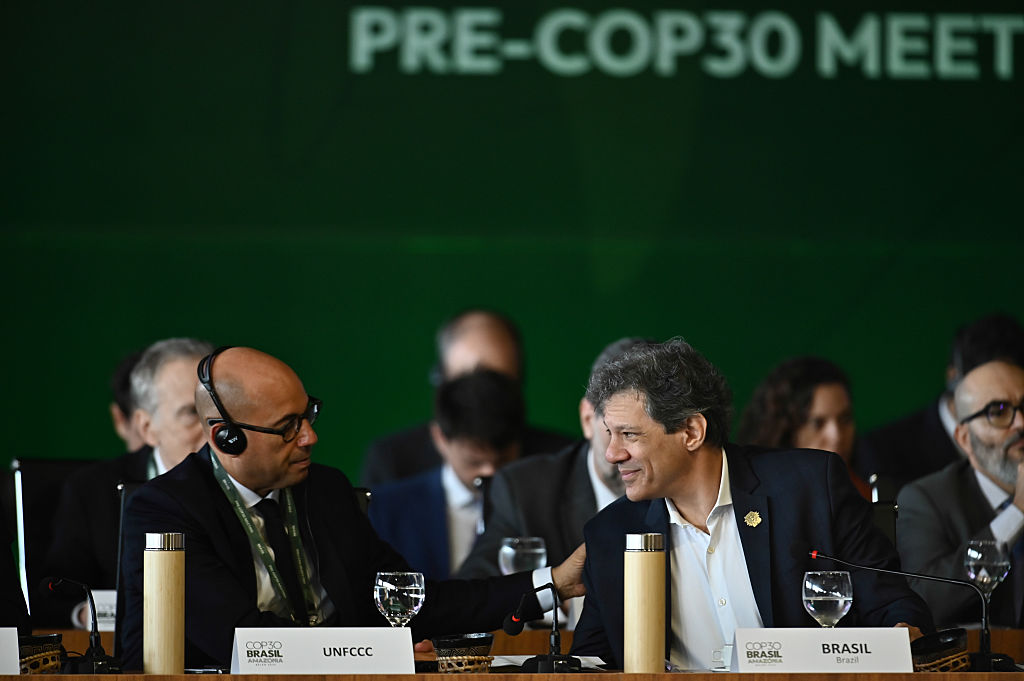Greetings from São Paulo where corporate executives from around the world have gathered ahead of this year’s United Nations climate talks—known as COP30. This is my second stop in a two-week trip to Brazil as I try to understand how the world is approaching climate change at this moment.
[time-brightcove not-tgx=”true”]
People always ask me whether it’s really worth spending so much time and energy at COP. This year, I’ve heard that question even more than usual given the rapid developments in the U.S.—from the AI-linked rise in power demand to the Trump Administration’s ongoing assault on climate policy.
My answer has never been clearer: to understand the state of climate efforts requires getting out of the U.S.—now more than ever. Acquiring a true sense of where things currently stand almost requires going region by region, sector by sector, technology by technology. And anticipating where things are headed means grappling with changing economics. For me, the COP experience is an opportunity to drink from a firehose and get a crash course in answering these questions. What I’ve learned is that geopolitical tension, reshaped trade dynamics, and technological advances all mean that when it comes to climate change, the U.S. is no longer in the driver’s seat.
For the past decade, a decent portion of my time at COP has been dedicated to trying to track down what the U.S. delegation is doing—whether that’s watching the U.S. broker compromises to help deliver the Paris Agreement or sitting in as the first Trump Administration pitched coal-fired power as a source of clean energy.
What the U.S. said mattered, so much so that negotiators from around the world had to bend to address the country’s domestic considerations. In 2015, U.S. negotiators held up talks in the wee hours of the morning over wording in one section of the Paris Agreement out of fear that it would trigger the need for Senate confirmation.
In Belém, the Amazon city where official COP30 proceedings are set to begin next week, heads of government from a few dozen countries gathered on Nov. 6 and 7 for a convening with the Brazilian president. The gathering was loaded with criticism of the U.S.—subtle and direct—but offered no indication that the rest of the world is following the U.S.’s lead.
That’s not to say that governments are moving at the necessary speed or scale. The vast majority of countries failed to submit new climate plans to the U.N. as they had pledged to do. Those that did submit by and large showed improvement in their emissions reduction efforts, but not enough to meet climate targets. But the heart of this COP—and indeed climate efforts generally right now—is really less about targets and more about implementation. Plans aren’t worth much if they aren’t put into action. And much of which is occurring to help bring these targets to life is in the private sector.
Indeed, in São Paulo, private sector leaders seem keen to try to understand the new landscape while remaining largely undeterred by the U.S. pullback. Electricity demand is rising around the globe, creating an incentive for clean energy investment to serve that need. Clean technology manufactured in China—like EVs—has become increasingly affordable, creating new opportunities for Chinese exporters and importers around the world. And in many countries, including Brazil, access to clean energy and bio-economy solutions—think of biofuels—means chances abound to invest in decarbonization today. “In Brazil, climate finance is really mainstream finance,” said Joaquim Levy, a former Brazilian Minister of Finance, on a panel I moderated in São Paulo this week.
And while policy efforts have slowed in some parts of the world, they continue in others. Brazil recently rolled out a new emissions trading scheme. Meanwhile, disclosure regimes requiring companies to disclose emissions and climate risks are kicking off in much of Asia.
What all of that amounts to at climate talks here in Brazil remains to be seen. The Brazilian hosts have rolled out some concrete programs aimed at creating momentum—including a landmark effort to protect forests and a roadmap to accelerate climate finance. But at the very least, attendees will leave Brazil with a sense that climate efforts are alive and well.
At a TIME dinner in Rio de Janeiro earlier this week, E2 Executive Director Bob Keefe, who we recognized this year on our annual TIME100 Climate list, summed it up well: “What else gives me hope?” he asked the crowd rhetorically. “It’s the realization that Washington D.C. is not America, and America is not the world.”
To get this story in your inbox, subscribe to the TIME CO2 Leadership Report newsletter here.
This story is supported by a partnership with Outrider Foundation and Journalism Funding Partners. TIME is solely responsible for the content.

